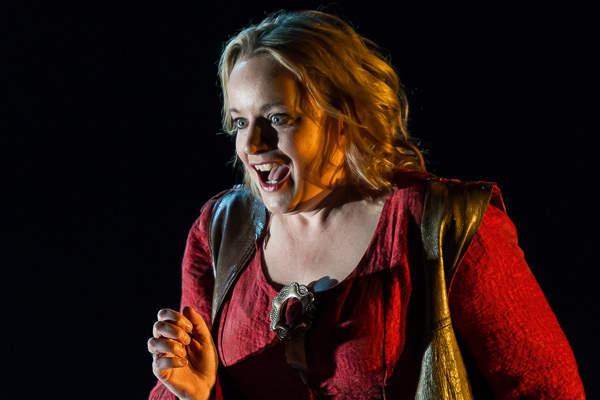If I said what I really thought about Götterdämmerung at the Longborough Festival, of which I saw the last of four performances, anyone who wasn’t there would think I was madly exaggerating; but anyone who was there would agree — I have run into several people who were at one or another of the performances, and they were all breathless with excitement and admiration for this astounding achievement. Raving doesn’t make for enjoyable reading, I realise, so I’ll try to be a bit more specific.
In the first place it was a tremendous team effort with, at its centre, the fanatical dedication and experience of the conductor, Anthony Negus, colleague of Reginald Goodall but very much his own man in particular points of interpretation. Act I under Negus, for example, was almost 20 minutes shorter than under Goodall; but Negus allows plenty of time for phrases to shape themselves, often in contrast to another phrase that is going on elsewhere, in the pit or on the stage, so that the sound is always lucid, balanced. Transitions, which Wagner set supreme store by, are always managed with a combination of care and spontaneity. The moment in Act I when Brünnhilde leaps up, exultantly anticipating the return of Siegfried from heroic endeavours, only to be appalled by its being Gunther, apparently, who has conquered the protective flames, is judged to a sickening T. The orchestra’s surging of anticipation at that point sweeps one along, to share Brünnhilde’s excitement, only to be annihilated by the thick thud of humiliation. Only the finest interpreters — about three or four — bring off this moment; Negus is among them. Indeed, there is no moment where he and his 60-plus orchestra of superlative musicians aren’t up to the challenges of this immense score.
Or, to be truthful, and perhaps increase credibility, there was one. The last performance was on the year’s hottest day, the temperature in the theatre was as it often is in the Festspielhaus in Bayreuth, which otherwise deserves no mention, and the brass did tire slightly in the climactic passage of Siegfried’s funeral music, the trumpet not quite managing to pierce the orchestral texture with the Sword motif. Elsewhere the winds were astonishing. In one of the Ring’s most demanding passages, scored for eight horns, which takes us from the nocturnal colloquy of Hagen and his anguished father Alberich to the boisterous appearance of Siegfried, extraordinarily beautiful music which nonetheless tells us that everyone will be dancing to Hagen’s hateful tune, the Longborough orchestra was perfect.
The performers of most of the leading roles in this four-year unfolding of the Ring have altered, though almost everyone I have heard (I missed Das Rheingold) has been at least satisfactory. But for Götterdämmerung they have struck gold. A new Brünnhilde, Rachel Nicholls, is simply sensational. Even bearing in mind the modest dimensions of the theatre, she sang with great force as often as needed, which is actually a great deal. In Act II her fury at Siegfried’s treachery was registered in electrifying outpourings, but she was still more moving in the long quiet passage at the beginning of the last scene of the act, where she broods wretchedly; indeed that whole stretch, where at last, after all the faked feelings and histrionics, the three characters on stage pour out their true feelings, probed more deeply than I can ever remember.
Eddie Wade’s splendid Gunther, a middle-management or bursarial type, and Stuart Pendred’s Hagen, the only questionable piece of casting — more of a Latino conman than a Nordic villain — contributed strongly in that poignant, hopeless scene. Though she was never less than superb, Nicholls surpassed herself in the final scene, really seemed to become the character, and conveyed understanding of the role with a naturalness that emphasised both her humanity and her divine origins.
Fortunately in the Estonian Mati Turi she had a Siegfried who was vocally equal to her. Turi does very little in the way of acting, mainly stands and looks benign, amused or bewildered, but the sounds he produces are of a different order from any Siegfried I have heard in decades, truly an heroic voice, and used with intelligence and subtlety. The rest of the cast is impressive, and I wish I had space to say more about the ditzy Gutrune of Lee Bisset, gorgeously sung, and the moving Waltraute of Alison Kettlewell, who didn’t submit to the temptation to turn her marvellous role into that of a tragedy queen.
Next year, all being well, there will be three cycles of the Ring at Longborough. I have no doubt at all that they will provide as great an experience as any other cycle anywhere, and am almost certain that they will be superior to them all — after all, it’s the conductor who counts most. I would only urge that the production be reconsidered, so that the peculiar advantage of being in a small theatre is fully taken advantage of, and the singers are all encouraged to live their parts as Rachel Nicholls does, so that the grateful ghost of Wagner may visit the scene.






Comments